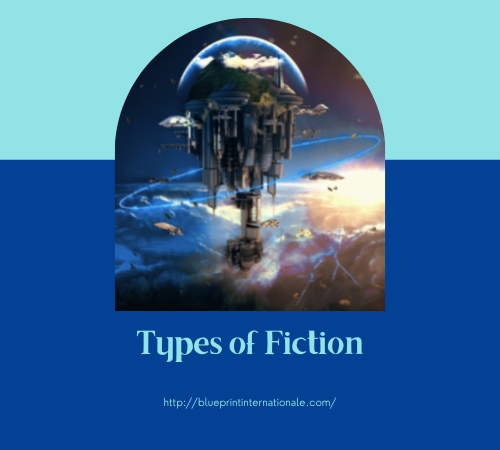There are different categories of fiction, and each of them has its subgenres. Here are the types of fiction and its definition.
Speculative Fiction
Speculative fiction is a wide genre of fiction that encompasses genres that include aspects that do not exist in reality, recorded history, nature, or the current world. Instead, this kind of literature explores various topics within the supernatural, futuristic, and other creative worlds. This overarching category encompasses multiple genres, including science-fiction, fantasy, horror, superhero fiction, alternative history, utopian and dystopian literature, and supernatural fiction, as well as hybrids thereof.
1. Alternate History
Concentrates on historical events as if they occurred differently, as well as their ramifications in the present.
2. Apocalyptic
It occurs before and during a major global catastrophe, usually a climatic or pandemic natural calamity on an unprecedented scale or a nuclear holocaust.
3. Dystopian
It takes place in a severely despotic society that is often afflicted by tight control, brutality, disorder, indoctrination, and other unpleasant aspects.
4. Fantasy
Fantasy is a subgenre of literature in which magic or other supernatural aspects play a significant role in the narrative, subject, or location. Numerous works in the genre are set in fantastical realms filled with magic and magical creatures. Fantasy is usually differentiated from science fiction and horror by the absence of scientific and macabre themes. Still, there is much overlap between the three, which are all subgenres of speculative literature. Frequently, fantasy writings take place in a medieval environment.
It includes elements and entities derived from or inspired by folklore, such as legendary creatures (dwarves, elves, dragons, and fairies), witchcraft, magic, and potions.
5. Horror
Focuses on frightening tales that inspire dread. Villains may be supernatural beings such as monsters, vampires, ghosts, demons, or ordinary individuals such as psychotic and brutal killers. Frequently involves violence and death.
6. Post-Apocalyptic
The story follows communities of survivors after major natural catastrophes on a global scale.
7. Science Fiction
Features technology and other aspects that do not exist in the real world but are believed to be developed or found in the future due to scientific progress, such as sophisticated robots, interplanetary travel, aliens, space travel, mutants, and cyborgs. Numerous science fiction tales are set in the future.
8. Superhero
The series focuses on superheroes (heroes endowed with exceptional skills or powers) and their conflict with sinister forces such as supervillains. Usually has aspects of science fiction or fantasy and may be considered a subgenre of those genres.
9. Supernatural
It draws on horror and fantasy elements; it exploits or necessitates inconsistencies in the everyday natural world and materialist beliefs about it as story devices or concepts.
10. Utopian
It takes place in a frequently portrayed civilization as sophisticated, joyful, clever, or even flawless or problem-free.
Genre Fiction
Genre fiction, sometimes referred to as popular fiction, is a phrase used in the book trade to refer to fictional works created with the intention of fitting within a particular literary genre designed to cater to readers and fans familiar with that genre.
1. Crime
A literary genre in which crimes, their detection, offenders, and their motivations are fictionalized. The genre is defined by suspense and mystery. It is often differentiated from mainstream literature and other genres such as historical fiction or science fiction, although the distinctions are imprecise. Numerous subgenres exist within crime fiction, including detective fiction (as in whodunit), courtroom drama, hard-boiled fiction, mystery fiction, and legal thrillers.
2. Historical Fiction
Historical fiction is a subgenre of literature in which the action takes place in a historical context. While the word is often used interchangeably with the historical book, it may also refer to other forms of storytelling, such as theater, opera, film, television, video games, and graphic novels.
A necessary component of historical fiction is that it takes place in the past and pays close regard to the customs, social circumstances, and other aspects of the era portrayed. Additionally, authors often examine significant historical personalities in various locations, enabling readers to get a deeper understanding of how these individuals may have reacted to their surroundings. Finally, specific subgenres, such as alternative history and historical fantasy, infuse a book with theoretical or historical aspects.
3. Horror
Horror literature is written with the intention of frightening or disgusting its readers. While many horror books include supernatural elements or creatures, this is not a must. Romanticism and Gothic literature heavily influenced early horror. Contemporary horror, such as cosmic horror and splatterpunk, is often more graphic and less theatrical. Horror is often intermingled with other genres.
4. Romance
The romance book, or “romantic novel,” is mainly concerned with the connection and romantic love between two individuals and must conclude with an “emotionally gratifying and hopeful resolution.”
5. Western
Western fiction is a subgenre of literature set mainly in the late nineteenth and early twentieth centuries in the Western United States dubbed the “Old West.” Its tales often concentrate around the life of a nomadic cowboy or gunfighter who rides a horse; they carry a pistol and/or a rifle.
Finding the right company that offers quality and affordable book marketing and publishing services is easy with Blueprint Press Internationale. Pick up your phone and dial (888) 617-8289 to know more. You can also go to blueprintinternationale.com for more details.




